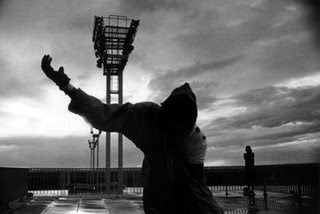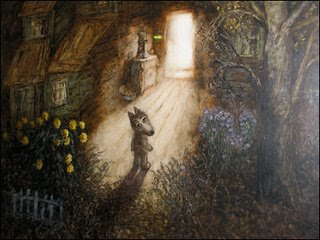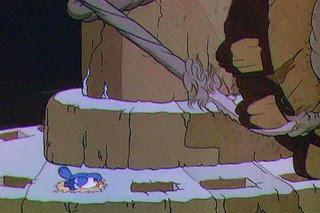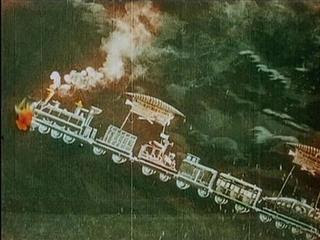Austria, 2 min
Directed by: Peter Tscherkassky
Written by: Peter Tscherkassky
Starring: Catherine Deneuve, Omar Sharif (archive footage)
 For some reason, you've got to admire any filmmaker who dedicates his entire career to re-editing other peoples' films. Peter Tscherkassky has done just that, and L'arrivée (1998) is my first taste of his work. Manipulating "found footage" from Terence Young's Mayerling (1968), this two-minute short is an overt homage to the Lumière brothers, visually suggesting Arrival of a Train at La Ciotat (1896). I've never really been taken by the notion of Deconstructionist cinema – that which explores the inherent artificiality of the film medium – but I found some interest in this particular piece. The picture seemingly opens without any film in the projector, showing only a white background with the far edge of the image creeping ever-so-sightly into frame. Owen Land's Film in Which There Appear Edge Lettering,… etc (1966) was excruciating because nothing happened, but Tscherkassky gives us the semblance of a narrative, something to anticipate: we urge forward the creeping film image as we might urge Jimmy Stewart up the stairs in Vertigo (1958).
For some reason, you've got to admire any filmmaker who dedicates his entire career to re-editing other peoples' films. Peter Tscherkassky has done just that, and L'arrivée (1998) is my first taste of his work. Manipulating "found footage" from Terence Young's Mayerling (1968), this two-minute short is an overt homage to the Lumière brothers, visually suggesting Arrival of a Train at La Ciotat (1896). I've never really been taken by the notion of Deconstructionist cinema – that which explores the inherent artificiality of the film medium – but I found some interest in this particular piece. The picture seemingly opens without any film in the projector, showing only a white background with the far edge of the image creeping ever-so-sightly into frame. Owen Land's Film in Which There Appear Edge Lettering,… etc (1966) was excruciating because nothing happened, but Tscherkassky gives us the semblance of a narrative, something to anticipate: we urge forward the creeping film image as we might urge Jimmy Stewart up the stairs in Vertigo (1958).Tscherkassky is remarking upon cinema's use of visual narrative, a well-worn formula that takes us back to Auguste and Louis Lumière. Anticipation, Crisis, Resolution: the camera awaits the arrival of a train, identically to how we, the audience, await the arrival of the film image into frame. Once the picture has settled into its correct groove, the train collides with its mirror-image, and the film negative almost destroys itself in a gut-wrenching tangle of film reels. Out of this chaos emerges actress Catherine Deneuve, who alights from the train, apparently unharmed by this temporal disruption of her own existence, and falls into the arms of her lover, Omar Sharif. Against all logic, out of this violence has materialised a happy ending, a final kiss offering resolution where there had been no hope of any. Critic Stefan Grissemann describes L'arrivée as "a film in the process of approaching." That sounds about right; it's a film whose very existence provides its own narrative.
5/10





_poster.jpg)


No comments:
Post a Comment
Note: Only a member of this blog may post a comment.